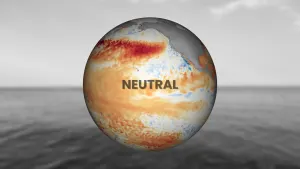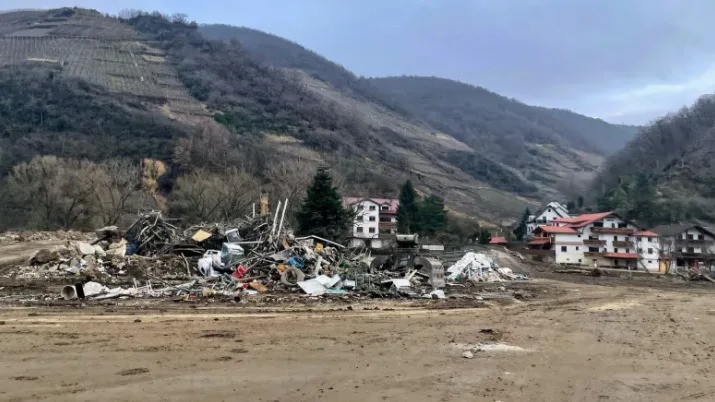
Deadly floods left this German town in tatters. Now it's trying to climate-proof
Our planet is changing. So is our journalism. This story is part of a CBC News initiative entitled "Our Changing Planet" to show and explain the effects of climate change and what is being done about it.
Standing on the tips of his toes, Alfred Sebastian stretches his arm as high as it will go toward the number 2021 spray-painted in red on the side of a building, which still bears brown watermarks from that horrific night in July.
"The high waters came here in 2016," said the mayor of the German village of Dernau, pointing at a mark three metres up the wall. "Here in 1910," he continued, pointing even higher, "and all the way at the top ― the catastrophic floods of this year."
Dernau, which is about 60 kilometres south of Cologne, was one of the communities worst affected by summer floods in 2021 in western Germany. It sits along the banks of the Ahr River, which snakes its way through the rolling vineyards of the Ahr Valley.
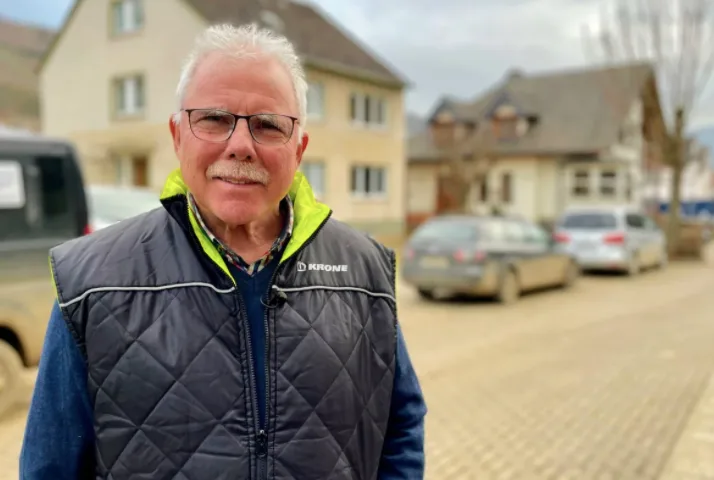
Dernau Mayor Alfred Sebastian, who himself was forced onto the roof of his house the night of the floods, is optimistic residents will return. (Natalie Carney/CBC)
High waters are not uncommon here, but on July 14, they reached a record height of seven metres, when torrential rains turned the river into a forceful rush of water that swept away cars, homes, even major infrastructure.
A 40-kilometre stretch of the Ahr Valley was destroyed and 134 people were killed in a matter of hours.
Dernau dentist Peter Wild, 55, and his wife, Judit, live three blocks from the Ahr. Even here, the water completely flooded the first two levels of their house. They have no floors and the walls have been stripped bare. Not a single piece of furniture remains.
"We threw all the equipment and furniture out of the window," Wild said, gesturing toward an open second-floor window. "All the furniture is out. Everything has been removed down to the bare concrete ― all the tiles, the flooring, everything."
More than half of the houses in Dernau are now uninhabitable, says Sebastian, as the floods spoiled the material with which they were built or destroyed their foundation completely.
The ferocity of the floods and the damage they caused was the worst weather disaster in Germany since the Second World War.
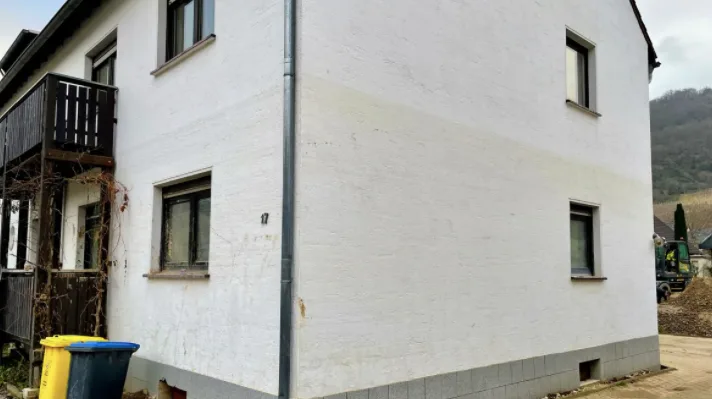
Brown watermarks are still visible on the sides of many remaining houses showing how high the water came on July 14. (Natalie Carney/CBC)
Five months later, electricity and clean water have not been fully restored, while the sounds of bulldozers and drills can be heard late into the night. Brown water lines are still visible on some houses, while empty lots are all that is left of others.
In the wake of the devastating effects of climate change, this German village has not only been forced to rebuild, but to rethink its future.
EMERGENCY SHELTERS
Local and international NGOs ― such as the Workers' Samaritan Federation (ASB), a German aid and welfare organization ― have set up temporary shelters. The ASB erected 11 residential container units in Dernau for the elderly.
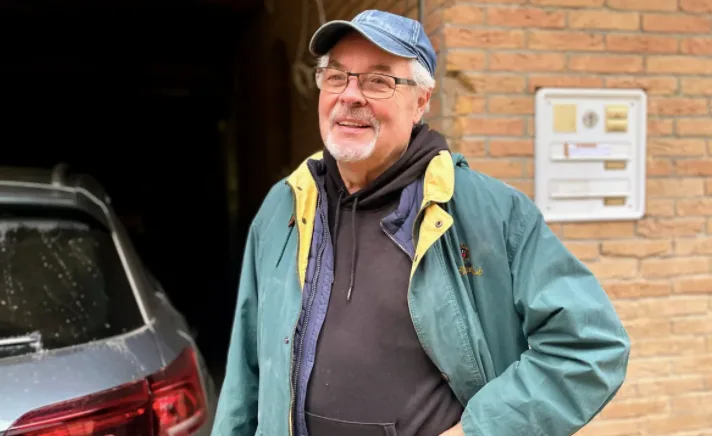
Peter Wild, pictured, and his wife Judit escaped to the third floor of their house in Dernau the night of July 14. (Natalie Carney/CBC)
These units come with a kitchen, bedroom, bathroom and living room and are a blessing for those who have nowhere else to go.
"Previously, these were refugee accommodations," said Armeen Kolians, the head of flood relief for ASB. "We have just laid the floors with vinyl, and repainted the walls. Then there is something like a menu service, a home emergency call system and all these things that may not have been needed before, but are now because of the difficult times."
As the holidays approached, Dernau residents put up Christmas trees in lots that now sit bare while festive decorations have been perched in the broken window frames of gutted buildings in an attempt to lift spirits.
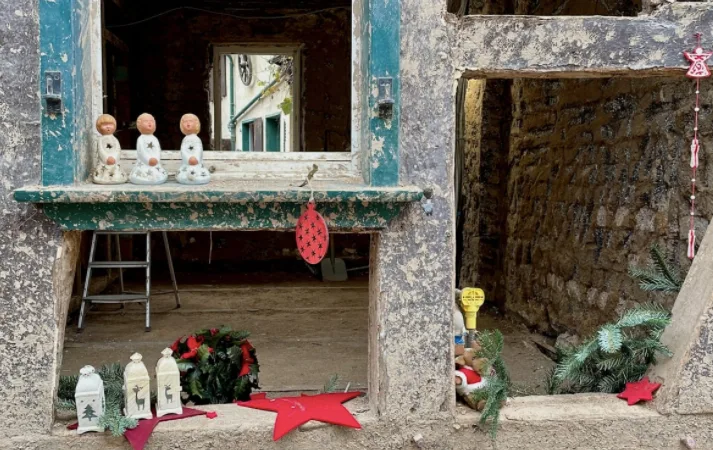
Christmas decorations are seen in the broken window panes of some gutted buildings in Dernau. (Natalie Carney/CBC)
"We had a population of 1,800," Mayor Sebastian said. "At the moment, there are considerably less. Emergency shelters were created and people looked for a free flat somewhere within a radius of a hundred kilometres so they could drive back to Dernau every day to rebuild their house."
Some former residents will not return, he says. "Ten per cent or so say, 'I can't live here anymore. I'm afraid that this flood will reach us again.' They are afraid when it starts to rain and so they have sold their house or are in the process of selling their house."
There is good reason for this, say some climate experts.
Miranda Schreurs, a professor of environment and climate policy at Munich's Technical University, says such catastrophic weather events will occur again, and with greater regularity.
"You can be pretty assured that what we've been seeing around the world this year will continue," she said. "And the impact will be enormous. We need to be thinking about changing our lifestyles so we become much less dependent on fossil fuels, and we need to think about what we can do to bring nature back. Change will be hard, it will be really hard, but it's so necessary."
STOPPING THE FLOODS
Mayor Sebastian agrees. He wants to use this as an opportunity to build back Dernau with heating and an electricity grid powered by renewable energy.
But this will take money.
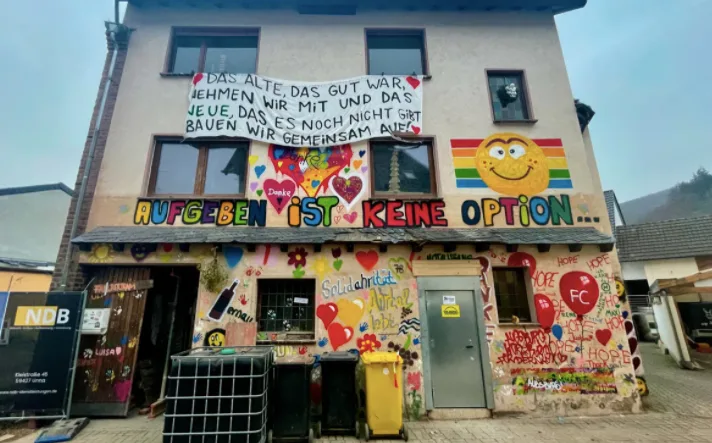
Some abandoned buildings have been spray-painted with words of love, support and environmental hope, including the slogan 'Aufgeben Ist Keine Option' (Giving up is not an option). (Natalie Carney/CBC)
Federal and state governments in Germany have agreed to a $35 billion US reconstruction fund for flood-ravaged areas, but Sebastian says that money has not yet reached the victims. He fears this will lead to people rebuilding with fossil fuel heating systems again.
He is also calling for a national flood action plan.
"We must create more space for the Ahr River," he argued. "We have to build retention basins in the tributary valleys, we have to implement a flood concept here in the next few years so that such a flood does not happen again, and we can live here without fear."
Germany's new centre-left governing coalition, which includes the Green Party, has placed a "green transition" at the top of their agenda. Environmentally friendly changes to infrastructure and energy production are expected across the country.
But that Christmas wish will come too late for those who have already lost so much in the Ahr Valley.
The area is known for being a must-see along Germany's wine trail, but now, the only visitors are NGOs and journalists, says Sebastian.
"We were like the Garden of Eden, a paradise. And now we are destroyed, but hope to again become what we always were: a place where we and the tourists can feel at home."
This article, written by Natalie Carney, was originally published for CBC News.








